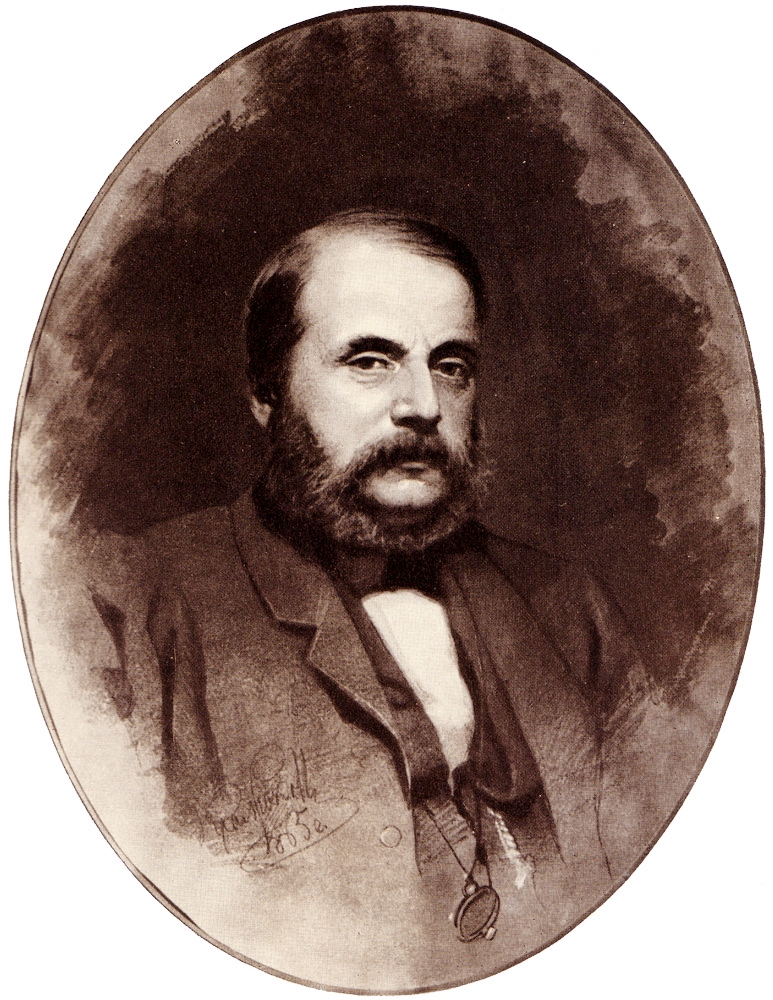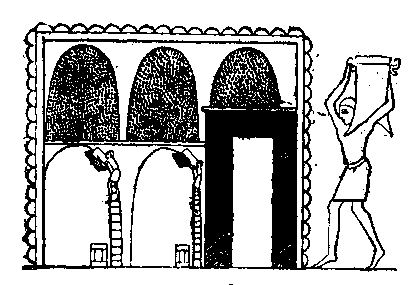|
Ivan Goncharov
Ivan Alexandrovich Goncharov (, also ; rus, Ива́н Алекса́ндрович Гончаро́в, r=Iván Aleksándrovich Goncharóv, p=ɪˈvan ɐlʲɪkˈsandrəvʲɪdʑ ɡənʲtɕɪˈrof; – ) was a Russian novelist best known for his novels ''The Same Old Story'' (1847), ''Oblomov'' (1859), and '' The Precipice'' (1869, also translated as ''Malinovka Heights''). He also served in many official capacities, including the position of censor. Goncharov was born in Simbirsk into the family of a wealthy merchant; as a reward for his grandfather's military service, they were elevated to gentry status. He was educated at a boarding school, then the Moscow College of Commerce, and finally at Moscow State University. After graduating, he served for a short time in the office of the Governor of Simbirsk, before moving to Saint Petersburg where he worked as government translator and private tutor, while publishing poetry and fiction in private almanacs. Goncharov's first novel, ' ... [...More Info...] [...Related Items...] OR: [Wikipedia] [Google] [Baidu] |
Ivan Kramskoi
Ivan Nikolaevich Kramskoi (russian: Ива́н Никола́евич Крамско́й; June 8 (O.S. May 27), 1837, Ostrogozhsk – April 6 (O.S. March 24), 1887, Saint Petersburg) was a Russian painter and art critic. He was an intellectual leader of the art movement known as the Wanderers between 1860–1880. Life Kramskoi came from an impoverished petit-bourgeois family. From 1857 to 1863 he studied at the St. Petersburg Academy of Arts; he reacted against academic art and was an initiator of the "Revolt of the Fourteen" which ended with the expulsion from the Academy of a group of its graduates, who organized the ''Artel of Artists'' (""). Influenced by the ideas of the Russian revolutionary democrats, Kramskoi asserted the high public duty of the artist, principles of realism, and the moral substance and nationality of art. He became one of the main founders and ideologists of the Company of Itinerant Art Exhibitions (or Peredvizhniki). In 1863–1868 he taught at the ... [...More Info...] [...Related Items...] OR: [Wikipedia] [Google] [Baidu] |
An Uncommon Story
''An Uncommon Story'' (russian: Необыкнове́нная исто́рия, translit=Neobyknovennaya istoriya) is an autobiographical literary memoir by Ivan Goncharov, written in 1875–1876 (with an 1878 addendum) and first published in 1924. Parts of it were later included into ''The Complete Goncharov'' (1978–1980, Vol VII). According to the ''Gale Encyclopedia of Biography'', ''An Uncommon Story'' "…confirmed the psychopathic side of ts author'spersonality; it is an account of imagined plots against him and imagined attempts by others to plagiarize his work." Many researchers disagreed, finding there was much more veracity to Goncharov's claims than had previously been reported. ''An Uncommon Story'' had one single agenda: to prove that Ivan Turgenev has not only borrowed major ideas, character types, and conflicts from Goncharov's '' The Precipice'' to use in his ''Home of the Gentry'', but also (in the author's words) "infused the best European literature ... [...More Info...] [...Related Items...] OR: [Wikipedia] [Google] [Baidu] |
Nikolai Karamzin
Nikolay Mikhailovich Karamzin (russian: Николай Михайлович Карамзин, p=nʲɪkɐˈlaj mʲɪˈxajləvʲɪtɕ kərɐmˈzʲin; ) was a Russian Imperial historian, romantic writer, poet and critic. He is best remembered for his fundamental ''History of the Russian State'', a 12-volume national history. Early life Karamzin was born in the small village of Mikhailovka (modern-day Karamzinka village of the Ulyanovsk Oblast, Russia) near Simbirsk in the Znamenskoye family estate. Another version exists that he was born in 1765 in the Mikhailovka village of the Orenburg Governorate (modern-day Preobrazhenka village of the Orenburg Oblast, Russia) where his father served, and in recent years Orenburg historians have been actively disputing the official version.''Mikhail Pogodin (1866)''Nikolai Mikhailovich Karamzin. Based on Writings, Letters and Opinions — Moscow: A. I. Mamontov Publishing, p. 1-3''Albert Starchevsky (1849)''Nikolai Mikhailovich Karamzin — S ... [...More Info...] [...Related Items...] OR: [Wikipedia] [Google] [Baidu] |
German Language
German ( ) is a West Germanic languages, West Germanic language mainly spoken in Central Europe. It is the most widely spoken and Official language, official or co-official language in Germany, Austria, Switzerland, Liechtenstein, and the Italy, Italian province of South Tyrol. It is also a co-official language of Luxembourg and German-speaking Community of Belgium, Belgium, as well as a national language in Namibia. Outside Germany, it is also spoken by German communities in France (Bas-Rhin), Czech Republic (North Bohemia), Poland (Upper Silesia), Slovakia (Bratislava Region), and Hungary (Sopron). German is most similar to other languages within the West Germanic language branch, including Afrikaans, Dutch language, Dutch, English language, English, the Frisian languages, Low German, Luxembourgish, Scots language, Scots, and Yiddish. It also contains close similarities in vocabulary to some languages in the North Germanic languages, North Germanic group, such as Danish lan ... [...More Info...] [...Related Items...] OR: [Wikipedia] [Google] [Baidu] |
Boarding-school
A boarding school is a school where pupils live within premises while being given formal instruction. The word "boarding" is used in the sense of " room and board", i.e. lodging and meals. As they have existed for many centuries, and now extend across many countries, their functioning, codes of conduct and ethos vary greatly. Children in boarding schools study and live during the school year with their fellow students and possibly teachers or administrators. Some boarding schools also have day students who attend the institution by day and return off-campus to their families in the evenings. Boarding school pupils are typically referred to as "boarders". Children may be sent for one year to twelve years or more in boarding school, until the age of eighteen. There are several types of boarders depending on the intervals at which they visit their family. Full-term boarders visit their homes at the end of an academic year, semester boarders visit their homes at the end of an acad ... [...More Info...] [...Related Items...] OR: [Wikipedia] [Google] [Baidu] |
XIX Forum IMG 20190915 01
19 (nineteen) is the natural number following 18 and preceding 20. It is a prime number. Mathematics 19 is the eighth prime number, and forms a sexy prime with 13, a twin prime with 17, and a cousin prime with 23. It is the third full reptend prime, the fifth central trinomial coefficient, and the seventh Mersenne prime exponent. It is also the second Keith number, and more specifically the first Keith prime. * 19 is the maximum number of fourth powers needed to sum up to any natural number, and in the context of Waring's problem, 19 is the fourth value of g(k). * The sum of the squares of the first 19 primes is divisible by 19. *19 is the sixth Heegner number. 67 and 163, respectively the 19th and 38th prime numbers, are the two largest Heegner numbers, of nine total. * 19 is the third centered triangular number as well as the third centered hexagonal number. : The 19th triangular number is 190, equivalently the sum of the first 19 non-zero integers, that is als ... [...More Info...] [...Related Items...] OR: [Wikipedia] [Google] [Baidu] |
Intelligentsia
The intelligentsia is a status class composed of the university-educated people of a society who engage in the complex mental labours by which they critique, shape, and lead in the politics, policies, and culture of their society; as such, the intelligentsia consists of scholars, academics, teachers, journalists, and literary writers. Conceptually, the intelligentsia status class arose in the late 18th century, during the Partitions of Poland (1772–1795). Etymologically, the 19th-century Polish intellectual Bronisław Trentowski coined the term ''inteligencja'' (intellectuals) to identify and describe the university-educated and professionally active social stratum of the patriotic bourgeoisie; men and women whose intellectualism would provide moral and political leadership to Poland in opposing the cultural hegemony of the Russian Empire. In pre–Revolutionary (1917) Russia, the term ''intelligentsiya'' (russian: интеллигенция) identified and described the s ... [...More Info...] [...Related Items...] OR: [Wikipedia] [Google] [Baidu] |
Decembrists Revolt
The Decembrist Revolt ( ru , Восстание декабристов, translit = Vosstaniye dekabristov , translation = Uprising of the Decembrists) took place in Russia on , during the interregnum following the sudden death of Emperor Alexander I. Alexander's heir apparent, Konstantin, had privately declined the succession, unknown to the court, and his younger brother Nicholas decided to take power as Emperor Nicholas I, pending formal confirmation. While some of the army had sworn loyalty to Nicholas, a force of about 3,000 troops tried to mount a military coup in favour of Konstantin. The rebels, although weakened by dissension between their leaders, confronted the loyalists outside the Senate building in the presence of a large crowd. In the confusion, the Emperor's envoy, Mikhail Miloradovich, was assassinated. Eventually, the loyalists opened fire with heavy artillery, which scattered the rebels. Many were sentenced to hanging, prison, or exile to Siberia. The co ... [...More Info...] [...Related Items...] OR: [Wikipedia] [Google] [Baidu] |
Masonic Lodge
A Masonic lodge, often termed a private lodge or constituent lodge, is the basic organisational unit of Freemasonry. It is also commonly used as a term for a building in which such a unit meets. Every new lodge must be warranted or chartered by a Grand Lodge, but is subject to its direction only in enforcing the published constitution of the jurisdiction. By exception the three surviving lodges that formed the world's first known grand lodge in London (now merged into the United Grand Lodge of England) have the unique privilege to operate as ''time immemorial'', i.e., without such warrant; only one other lodge operates without a warrant – the Grand Stewards' Lodge in London, although it is not also entitled to the "time immemorial" title. A Freemason is generally entitled to visit any lodge in any jurisdiction (i.e., under any Grand Lodge) in amity with his own. In some jurisdictions this privilege is restricted to Master Masons (that is, Freemasons who have attained the ... [...More Info...] [...Related Items...] OR: [Wikipedia] [Google] [Baidu] |
Grain Trade
The grain trade refers to the local and international trade in cereals and other food grains such as wheat, barley, maize, and rice. Grain is an important trade item because it is easily stored and transported with limited spoilage, unlike other agricultural products. Healthy grain supply and trade is important to many societies, providing a caloric base for most food systems as well as important role in animal feed for animal agriculture. The grain trade is as old as agricultural settlement, identified in many of the early cultures that adopted sedentary farming. Major societal changes have been directly connected to the grain trade, such as the fall of the Roman Empire. From the early modern period onward, grain trade has been an important part of colonial expansion and international power dynamics. The geopolitical dominance of countries like Australia, the United States, Canada and the Soviet Union during the 20th century was connected with their status as grain surplus c ... [...More Info...] [...Related Items...] OR: [Wikipedia] [Google] [Baidu] |
Ulyanovsk
Ulyanovsk, known until 1924 as Simbirsk, is a city and the administrative center of Ulyanovsk Oblast, Russia, located on the Volga River east of Moscow. Population: The city, founded as Simbirsk (), was the birthplace of Vladimir Lenin (born Ulyanov), for whom it was renamed after his death in 1924; and of Alexander Kerensky, the leader of the Russian Provisional Government which Lenin overthrew during the October Revolution of 1917. It is also famous for its writers such as Ivan Goncharov, Nikolay Yazykov and Nikolay Karamzin, and for painters such as Arkady Plastov and Nikas Safronov. UNESCO has designated Ulyanovsk as a City of Literature since 2015. History Simbirsk was founded in 1648 by the boyar Bogdan Khitrovo. The fort of "Simbirsk" (alternatively "Sinbirsk") was strategically placed on a hill on the Western bank of the Volga River. The fort was meant to protect the eastern frontier of the Tsardom of Russia from the nomadic tribes and to establish a permanent royal ... [...More Info...] [...Related Items...] OR: [Wikipedia] [Google] [Baidu] |





